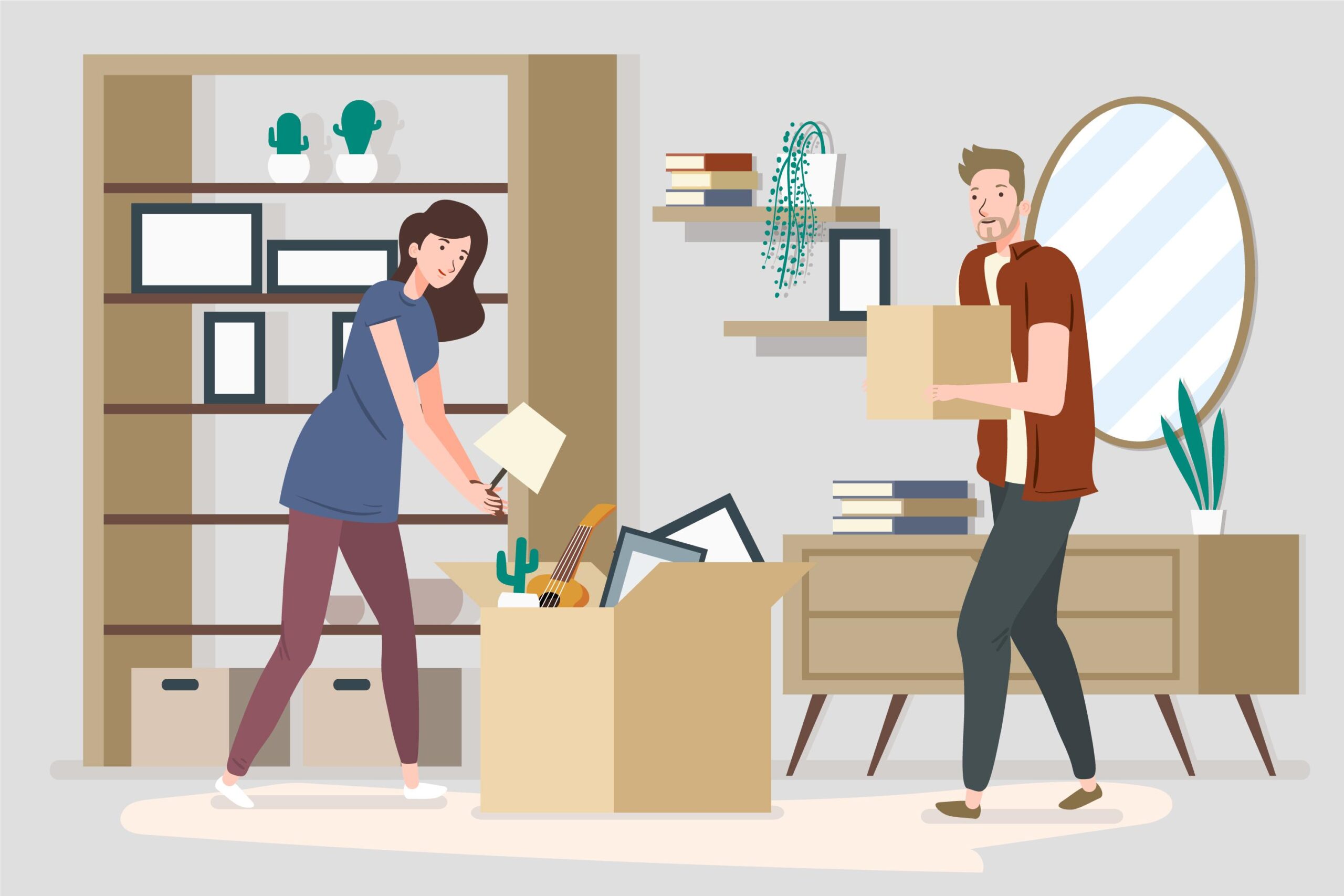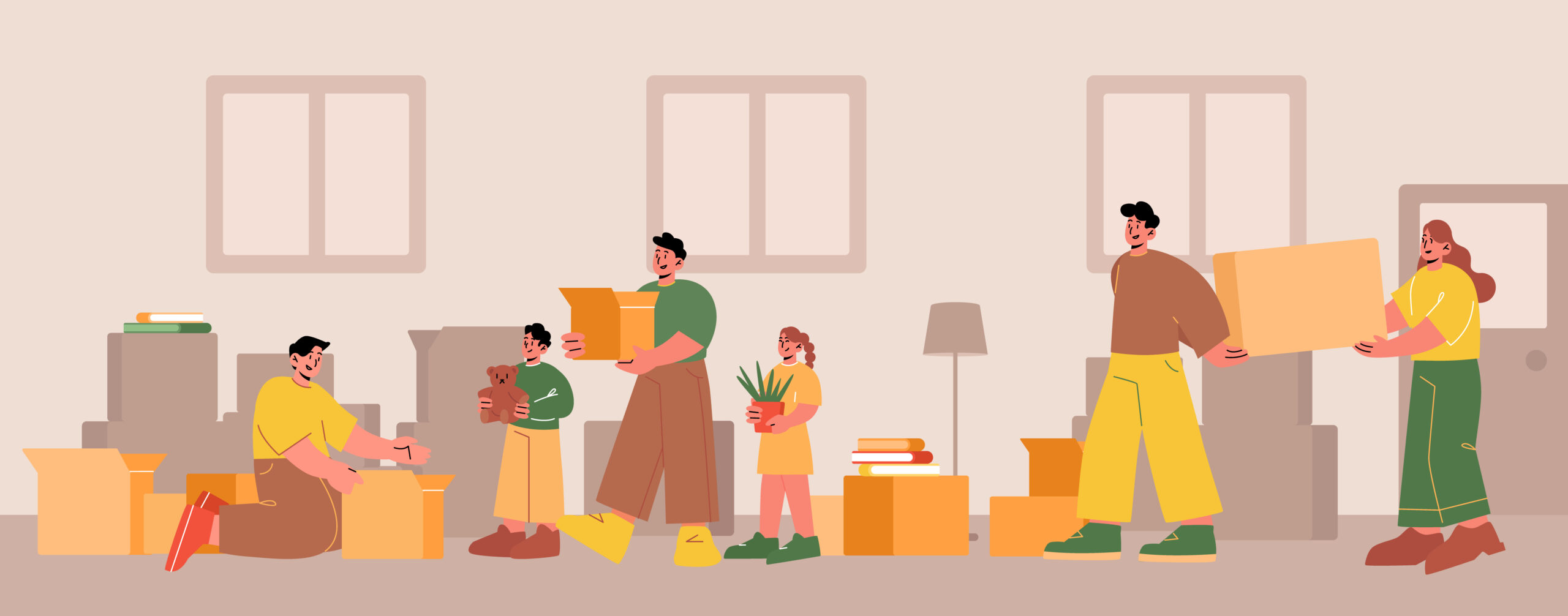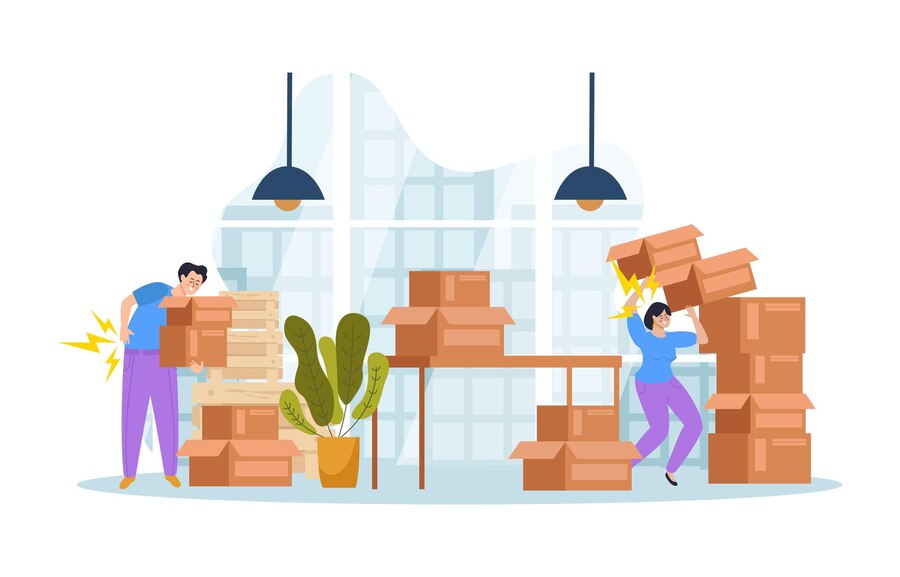Clients tend to hold on to items for an extended period of time, leading to a build-up of clutter that impacts their daily lives and surroundings. From busy professionals to growing families and downsizing seniors, decluttering your home is essential to help you filter out valuable items while creating a safer, more comfortable environment.
Whether you need to clear a room, or an entire home, Care To Move helps you declutter, allowing you to focus on what truly matters and make better use of your space.
Top Situations To Declutter Your Home
The following are some of the top situations where you must declutter your home:
Support For Seniors
-
Post-Retirement Lifestyle Shift:
Retirement is a significant transition in seniors’ lives, making it crucial to simplify their living space so they can focus on the lifestyle change. At Care To Move, we help seniors with retirement relocation and letting go of all possessions they no longer require, to create space for new items, or to make a transition into a smaller home, stress-free.
-
Medical Emergencies And Hospital Discharges:
Seniors who experience medical emergencies often return to living spaces that do not suit their health needs. Decluttering becomes crucial in this situation, especially if space for medical equipment is required.
-
Planning For Legacy And Estate Distribution:
During the preparation of handling estate matters or leaving a legacy, seniors feel the weight of sorting through their belongings. In this case, our decluttering services help seniors take control through the proper organisation of important documents, collectables, jewellery, and other valuable assets.
-
Downsizing After Children Move Out:
After children move out, it’s common for seniors to move to a smaller home. The process of decluttering is required, as it reduces the belongings to fit the new home. This lowers the stress and the cost of moving, as only the essential items need to be packed, transported, and unpacked in the new space.
Navigating Life Changes
-
Following A Breakup Or Divorce:
Decluttering is essential in moving forward, especially after a breakup or divorce. Before a divorce relocation, letting go of shared furniture, clothing, and other items helps you release emotional baggage. It allows you to start fresh in a space filled with belongings that truly feel like your own.
-
After Losing A Loved One:
Losing a loved one is a very difficult time to process, which makes it natural for an individual to hold on to items that remind them of them. Decluttering these possessions after an appropriate time can lead to healing, where you can keep the meaningful items and let go of the rest. This helps you release the emotional weight of managing someone else’s belongings while creating a peaceful space. We can organise staff to enter a room or home and clear items that are no longer required with respect and dignity in relation to the situation.
The Emotional Impact Of Decluttering And How To Overcome It
Most individuals form emotional attachments to their belongings, viewing them as extensions of themselves or as reminders of loved ones and significant life events. This attachment can make parting with such items during the decluttering process feel like a loss, generating feelings of guilt, sadness, or regret. Cognitive dissonance often arises as individuals experience an internal conflict between the desire for a clutter-free space and the emotional pull of their possessions. This conflict can lead to anxiety and overwhelming feelings when making decisions about what to keep or discard, triggering discomfort and resistance to change.
The act of decluttering can also prompt an identity crisis as individuals confront the sentimental value of their belongings, revealing how deeply intertwined these items can be with self-image and personal narratives. Sorting through possessions linked to different life stages can evoke strong emotions, forcing individuals to reflect on their identities and the changes they have undergone. This introspective process encourages self-reflection through decision-making, allowing individuals to examine their relationships with material possessions. Many may realise that they have collected items to fill emotional voids or to conform to societal expectations. Additionally, certain possessions may serve as reminders of unfulfilled dreams or paths not taken, leading to an emotional reckoning with missed opportunities and shifting priorities, which can generate feelings of disappointment.
Overcoming Strategies:
- Acknowledge Emotions: The first step towards decluttering is acknowledging your emotions related to your items. Journaling about your feelings can help you identify your items’ true significance, which can help you make decisions.
- Create A Memory Box: You can consider creating a memory box for items with strong sentimental feelings. However, you must limit the box size to keep only the most cherished items for preserving memories without the clutter.
- Reframing Your Perspective: Reframing your perspective about your possessions can help you overcome your emotional attachment, where you can try cherishing the experience and memories rather than valuing the object itself. You can also reflect on what you want to pass on to your future generation, as sometimes sharing stories about items may seem more valuable than holding on to them.
- Adopt A “One-In, One-Out” Rule: You can adopt a “one-in, one-out” Rule where you can try to let go of one possession every time you get a new item. This will help you be in control without feeling overwhelmed.
- Time Blocks: Try allocating specific time frames for decluttering, i.e., dedicate 20-30 minutes daily to tackling one area, making the whole process more manageable.
- Gradual Decluttering: Begin with less emotionally significant items before moving towards objects tied to identity, allowing for better emotional adjustment.
- Focus On Growth: You must remind yourself that letting go of your past identities does not mean losing them; rather, you are making more space for new ones. This means that every item you discard comes with an opportunity to embrace the present and future.
- Practise Mindful Decluttering: Before deciding which item to discard, ask yourself whether it adds value to your life or simply takes up space. This will help you shift your focus from materialism to intentional living.
- Focus On Quality Over Quantity: During decluttering, keep only those objects that add value to your space and align with your values.
Now that we have discussed the emotional impact of decluttering and the ways to overcome it, it is time to understand how the whole process improves your well-being.
How Decluttering Can Improve Your Health And Well-Being
-
Lowers Stress And Anxiety
Decluttering helps create a calm environment, promotes mental clarity and reduces the visual reminder of all the tasks left undone. This means that as your space becomes more organised, your mind can also find peace, reducing stress levels.
-
Boosts Productivity And Focus
Opting for effective decluttering can help improve efficiency and help you concentrate better on the task at hand. This allows for the smooth completion of any work, boosting productivity.
-
Improves Sleep Quality
Clearing out unwanted furniture, clothing, or decor will help you organise and declutter your space, which will, in turn, improve your sleep quality and contribute to improved cognitive function, physical health, and overall well-being.
-
Reduces Allergens
Decluttering can reduce the number of surfaces where dust settles, allowing for easy cleaning. This improves air quality and minimises the risk of allergy flare-ups, respiratory issues, asthma, and skin irritations.
Common Decluttering Mistakes And How To Avoid Them
-
Tackling Too Much At Once
One of the biggest mistakes when decluttering is trying to clean out the entire house or workspace in one go. Decluttering is a time-consuming process where attempting to tackle everything at once can result in frustration, burnout and quitting halfway through. Further, many people fail to create a clear plan or set specific goals, resulting in the movement of objects without making any real progress.
How to avoid it: Focus on a particular space that needs the most attention, set realistic goals like decluttering a single closet, corner, etc., and establish a particular timeline for its completion. This makes the entire process easy and allows you to see progress in small steps.
-
Holding Onto Items “Just In Case”
Individuals often hold objects they do not use, fearing they might need them someday. This “just in case” mindset makes it difficult to let go of things, leading to unnecessary clutter
How to avoid it: You must honestly analyse whether you will need certain items in the future, especially if you haven’t used them for a long time
-
Not Following Through
Decluttering isn’t just about sorting things as people think. This misconception leads them to create piles of items to discard or donate, but they never actually get rid of them. As a result, clutter is merely relocated rather than eliminated.
How to avoid it: Whether you are planning to donate to a local charity or scheduling a pick up for a larger item, start setting a deadline for removing the unwanted items.
-
Buying More Storage Instead of Reducing Items
Many individuals make the Common Decluttering Mistake of buying more storage solutions when faced with clutter. This reliance on storage bins, shelves, and containers simply hides the mess and does not address the root cause.
How to avoid it: Buy the storage solution only after you have decluttered the entire place and know what valuable items need to be stored.
After learning about common decluttering mistakes and ways to overcome them, let’s move to the next section, which will help you manage this entire process efficiently.
Maintaining A Clutter-Free Lifestyle: Habits For Long-Term Success
-
Create Designated Storage Spaces
Assign every item a designated storage space as it prevents things from being randomly placed, preventing clutter buildup. Whether it’s bookshelves or a filing cabinet for paperwork, knowing where everything belongs makes it easier to tidy up the space. For this, you can also use clear containers, labels, and drawer organisers to keep things in order. This will encourage the habit of returning items to their designated spot immediately after use.
-
Practice Mindful Consumption
Being mindful of your purchases plays a vital role in maintaining a clutter-free lifestyle. This means that before buying any product, you must ask yourself if the item is truly needed, if you have something similar, or if it’s just an impulse purchase. Reducing unnecessary purchases minimises the chances of clutter building up, and practising this mindful consumption can also lead to long-term financial savings.
-
Create An “Exit Strategy” For Unwanted Items
Sometimes, it’s easy to declutter a space and set items aside for donation or disposal, but following through becomes a challenge. For this, you can establish a fixed area or bin and commit weekly or bi-weekly to drop all the items for disposal.
-
Develop A Daily Reset Routine
One of the most effective habits is to develop a daily reset routine, where at the end of each day, you only have to take 10-15 minutes to tidy up your space. This involves putting away the left-out items, clearing off the counters while ensuring everything is in it’s proper place, and keeping things in control. Through this habit, you can also avoid the overwhelming tasks of deep cleaning, resulting in a consistently decluttered environment.
Conclusion: Embrace The Benefits Of A Clutter-Free Home
Decluttering is the ideal choice to lead a healthy and fulfilling life that prepares you for the future, simplifies your maintenance routine, and helps you manage your finances. It becomes especially important for individuals downsizing for retirement, navigating life changes, or managing medical conditions, as it helps align their living spaces with their evolving needs. From reducing stress and enhancing productivity to improving emotional and physical well-being, a decluttered space can enhance mental clarity, improve mood, increase functional space, and simplify decision-making. So, start your decluttering journey with Care To Move Today for a seamless, stress-free experience that helps you reclaim your space and improve your well-being.






